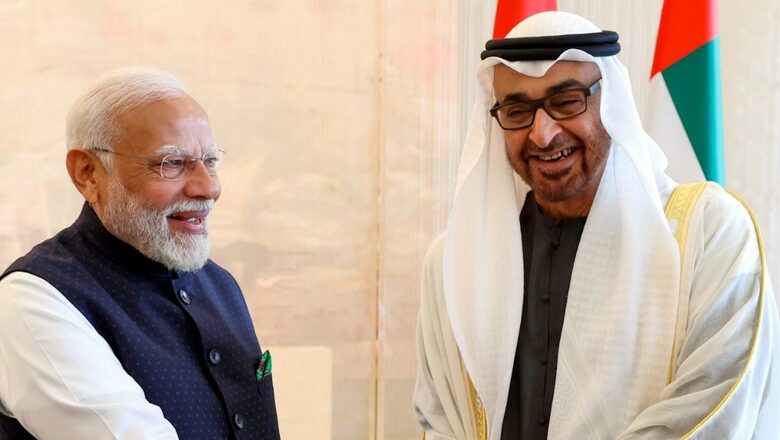
views
The inauguration of the BAPS Swaminarayan Temple in Abu Dhabi by PM Modi is a momentous occasion for all Indians and the Sanatanis living in Abu Dhabi. This temple stands as a majestic testament to the timeless ethos of India’s spiritual heritage, radiating a message of peace, unity, and fraternity to the world while also symbolising India’s strong relationship with the UAE. PM Modi’s visionary leadership has once again showcased India’s commitment to fostering global harmony and understanding through cultural exchange.
Indeed, Prime Minister Narendra Modi’s highly successful two-day visit to the UAE in February 2024, his seventh visit to the Emirates since 2015 and his third in the last eight months is historic in more ways than one. Talking about the first Hindu temple in Abu Dhabi, PM Modi said, “UAE has written a golden chapter in human history.” While addressing the ‘Dedication Ceremony’ of the BAPS Hindu Mandir, he thanked the UAE President and said, “India is working for ‘One Earth One Health’ mission,” and announced that the UAE will provide land for the construction of a hospital primarily for Indian labourers in the Emirates. To cut to the chase, India-UAE cooperation across various sectors is the stuff that legendary diplomatic folklore is made of.
It was in 2015 that Modi became the first Prime Minister of India to visit the UAE in 34 years. This visit was followed by the visit of HH Sheikh Mohamed Bin Zayed Al Nahyan to India in 2016. Then in 2017, Al Nahyan was the chief guest at India’s Republic Day celebrations, with the relationship formally getting elevated to a comprehensive strategic partnership. India-UAE trade rose to $85 billion in 2022, making the UAE India’s second-largest export destination and trading partner. In February 2022, India became the first country with which the UAE signed a comprehensive economic partnership agreement (CEPA).
Bilateral trade has increased by over 15 per cent since the CEPA came into force on May 1, 2022. UAE became the 4th largest investor in India in 2022-2023, compared to 7th in 2021-2022. The plan of the Abu Dhabi Investment Authority (ADIA) to set up a presence in Gujarat International Finance Tec-City (GIFT City), a financial free zone in Gujarat, in the next few months is another welcome move to further facilitate investment opportunities for the UAE in India. Both sides are increasing investment across the energy spectrum, including in India’s green hydrogen and strategic petroleum reserve programmes.
The UAE has openly appreciated the hosting of the Voice of Global South Summit by India in January 2023. The Indian side also commended the UAE for its instrumental role in promoting the Global South’s interests at COP28 and making COP28 a “COP of action”. The signing of a Memorandum of Understanding (MoU) for the establishment of a framework to promote the use of local currencies (INR-AED) for cross-border transactions by the governors of the respective Central Banks of India and UAE further cemented the ties. Developing the Local Currency Settlement System (LCSS) between the two countries to settle bilateral trade is a reflection of mutual confidence. Moreover, it underlines the robustness of the economies in both countries and enhances the economic engagement between the UAE and India.
The IIT-Delhi Abu Dhabi campus has become operational, offering a Master’s program in Energy Transition and Sustainability. Other Bachelor’s, Master’s and PhD level programs are expected to be offered from September 2024, in addition to establishing research centres in the fields of sustainable energy, climate studies, computing, and data sciences.
Recognising the importance of food security, India has reiterated its resolve to promote the reliability and resilience of food supply chains and expand food and agriculture trade through food corridor projects in India and the UAE. People-to-people contacts, which date back centuries, are one of the strongest and most important pillars of the historic India-UAE ties and under PM Modi, this bond has only strengthened in the last 10 years. Joint commitment to the fight against extremism and terrorism, including cross-border terrorism, hate speech, discrimination, and incitement, form the cornerstones of the India-UAE friendship under the Modi era. Coordination between the two sides on UN Security Council matters, especially in 2022, when both countries served as non-permanent members of the UNSC, was seamless. The UAE has repeatedly reiterated its endorsement of India’s bid for permanent membership of the reformed UNSC.
When UAE President Mohamed Bin Zayed Al Nahyan visited Gujarat earlier this year, several agreements were signed. The UAE was invited as a special invitee for the G20 Summit during India’s Presidency of the grouping. In February 2023, the India UAE-France (UFI) trilateral was formally launched. With India’s active support, the UAE joined SCO as a dialogue partner in May 2023. The UAE also joined BRICS as a member in January 2023 with PM Modi’s support.
The India-UAE defence cooperation is also on an upswing in the last few years. In January 2024, the first India-UAE bilateral army exercise ‘Desert Cyclone’ was held in Rajasthan. Over the years, India’s relationship with the UAE has evolved into one of its most prominent bilateral relationships. The UAE not only serves as a strategic partner but also plays a pivotal role in India’s engagement in the Gulf region. Prime Minister Modi’s visit to the UAE in February 2024 holds special significance as he inaugurated the 108 feet tall, Bochasanwasi Shri Akshar Purushottam Swaminarayan Sanstha (BAPS) temple in Abu Dhabi, spread over 27 acres and built with pink sandstone from Rajasthan and Italian white marble.
Despite India establishing diplomatic relations with the UAE way back in 1972, it took a leader as tall as Prime Minister Modi to elevate the India-UAE bilateral ties into a potentially powerful force within the Gulf region. The aim is to boost bilateral merchandise trade to above $100 billion and services trade to over $15 billion going forward. A trade agreement is also an enabler for two-way investment flows. Many Indian companies have set up manufacturing units either as joint ventures or in Special Economic Zones (SEZs) for cement, building materials, textiles, engineering products, consumer electronics, etc. in the UAE.
Under India’s revamped FTA strategy, the Modi government has prioritised at least six countries/regions to deal with, in which the UAE figures at the top of the list for an early harvest deal (or Interim Trade Agreement), the others being the UK, the EU, Australia, Canada, Israel and a group of countries in the Gulf Cooperation Council (GCC). UAE has over 3.3 million Indians and Emiratis are quite familiar and receptive to Indian culture. India participated as the Guest of Honour in the Abu Dhabi International Book Fair 2019. The Emirati community also participates in our annual International Yoga Day events and various meditation centres are running successfully in the UAE. Ever since PM Modi took charge at the helm in May 2014, he has given a whole new dimension to India-UAE relations.
India and the UAE are also actively collaborating in the fintech sector. Initiatives such as the acceptance of the RuPay card in the UAE since August 2019 and the operationalisation of a Rupee-Dirham settlement system demonstrate mutual convergence in digital payment systems. This could not have happened without PM Modi’s foresight and vision. The creation of the LCSS enables exporters and importers to invoice and pay in their respective domestic currencies, which in turn would enable the INR-AED foreign exchange market. India and the UAE are actively engaged in various regional groupings and initiatives such as the I2U2 and the India-Middle East-Europe Economic Corridor (IMEC), reflecting shared interests and strategic alignment. India often finds itself in a delicate diplomatic position due to the ongoing conflict between Iran and Arab nations, notably the UAE, but thanks to PM Modi’s personal equity and charisma, India has deftly navigated many a tricky situation, adroitly.
Despite US sanctions on Iran, India continued to import oil from the country, accounting for approximately 10 per cent of its total oil imports. Collaborating with the UAE in sectors like renewable energy, technology startups, fintech, and other emerging industries has bolstered our economic ties with the UAE and its vision of economic transformation away from traditional oil-centric models.
Addressing the gathering at the ‘Ahlan Modi’ diaspora event in Abu Dhabi this week, PM Modi highlighted the significant achievements in the education sector, stating that “more than 1.5 lakh Indian students are studying in UAE schools. The master’s course was started at the IIT-Delhi campus here last month and a new CBSE office will be opened soon in Dubai. These institutions will be helpful in providing the best education to the Indian community here.” Addressing the cultural ties between India and the UAE, Modi commended the close linguistic affinity and praised the accomplishments of both nations as exemplary for the world.
In addition to the UAE being among the largest sources of crude and LPG, India is now entering into long-term contracts for LNG, which bodes well for India’s energy security. Besides, in the just concluded visit, an MoU was signed for mutual cooperation in digital infrastructure projects to facilitate the sharing of technical knowledge, skills and expertise. On the cultural front, the two sides signed a “cooperation protocol between the national archives of the two countries”, which will shape extensive bilateral cooperation including the restoration and preservation of archival material. An MoU for cooperation in the field of heritage and museums will foster engagement between the two countries aimed at supporting the Maritime Heritage Complex at Lothal, Gujarat. Ahead of PM Modi’s visit, RITES Limited and Gujarat Maritime Board signed an agreement with Abu Dhabi Ports Company for building port infrastructure and enhancing connectivity between the two countries.
India and the UAE also signed agreements on interlinking of digital payment platforms — UPI (India) and AANI (UAE). This will facilitate seamless cross-border transactions between the two countries. This follows the MoU on interlinking payment and messaging systems signed in July last year during Modi’s visit to Abu Dhabi. The two nations signed a pact on interlinking domestic debit/credit cards — RuPay (India) with JAYWAN (UAE). This is an important step in building financial sector cooperation and will enhance the universal acceptance of RuPay across the UAE, in a glowing tribute to how the relentless pursuit of his vision has made Digital India a cross-border reality now.
To cut a long story short, Prime Minister Modi’s just-concluded visit to the UAE underscores the deepening and multifaceted ties between the two nations. Beyond religious landmarks, the relationship encompasses robust economic partnerships, exemplified by burgeoning trade and significant investments. As India and the UAE continue to forge ahead with their exceptional strategic partnership, they signal a model of convergence and mutual respect that is poised to strengthen further in the future and a large part of that has to do with the potent Narendra Modi factor that combines the best of both–diplomatic heft and India’s expanding soft power.
Sanju Verma is an Economist, National Spokesperson of the BJP and the Bestselling Author of ‘The Modi Gambit’. Views expressed in the above piece are personal and solely those of the writer. They do not necessarily reflect News18’s views.












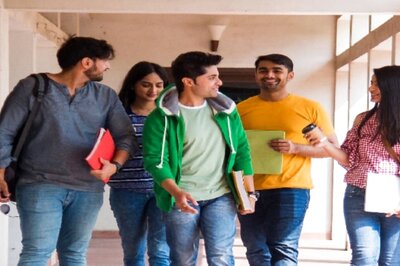

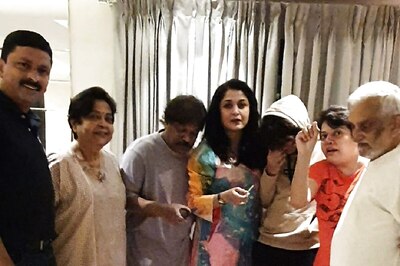
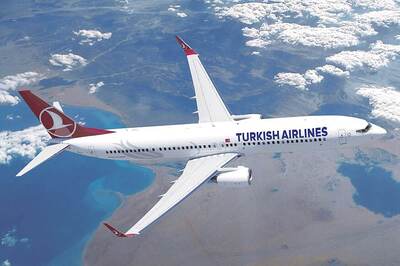
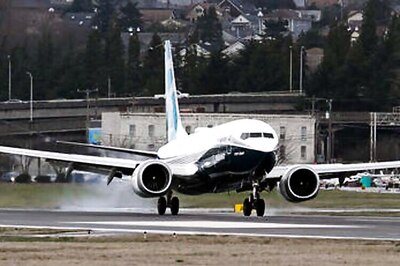

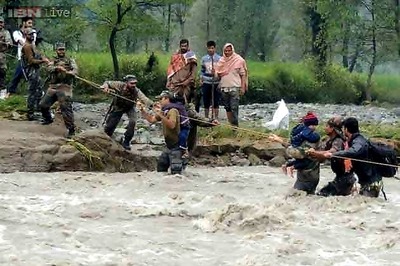

Comments
0 comment